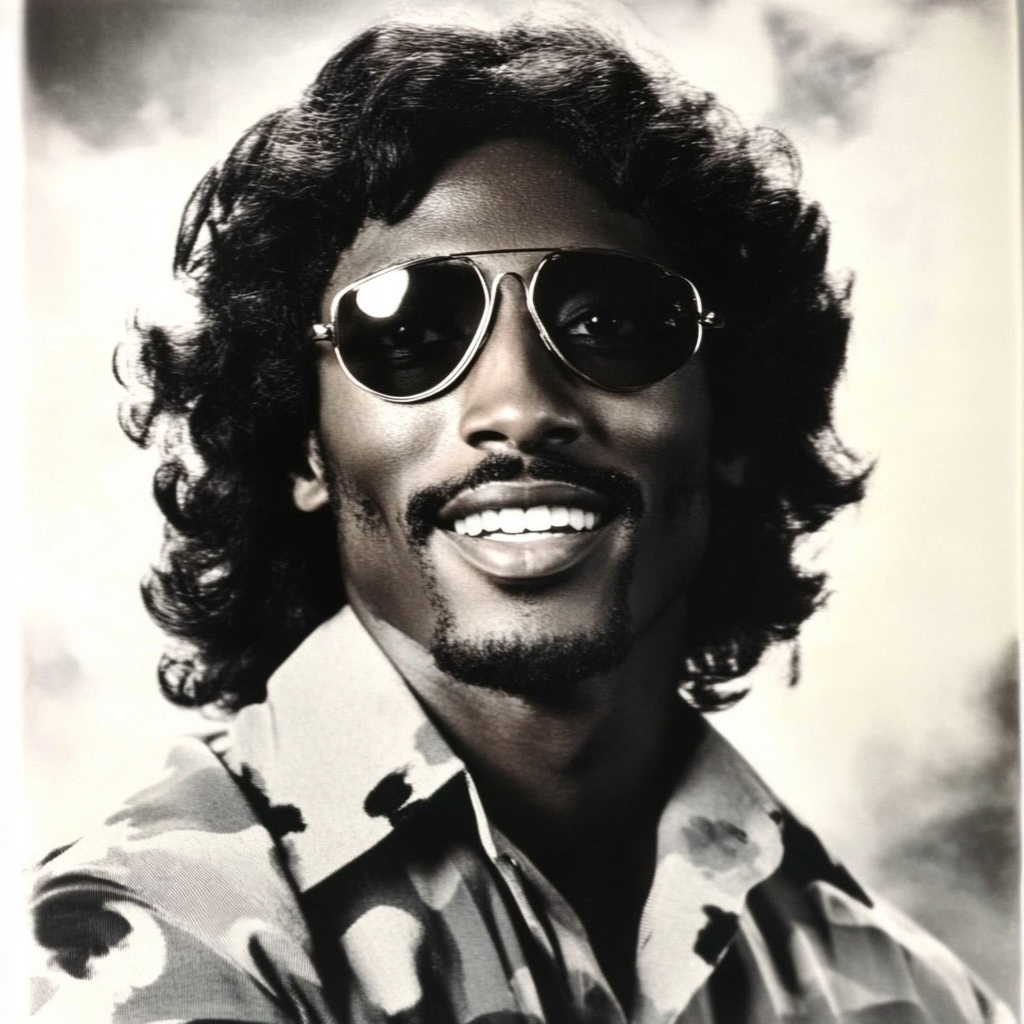Who is Frankie Crocker?
For nearly four decades, Frankie Crocker redefined radio broadcasting. As a legendary radio personality and influential African American broadcaster, he was more than a DJ. He wove sounds into a tapestry that captured New York City's soul.
He was dubbed “Hollywood” for his larger-than-life presence. His creative genius forever changed New York City DJ culture. Especially at WBLS, his innovative formats left a lasting mark on the industry.
Crocker began his career in Buffalo and quickly made his mark in Manhattan. At WBLS, he confirmed the station's top status in late 1970s New York City12. Not staying within radio, he also made significant strides in TV and film. His every beat and moment on air captured the city's heartbeat.
Outside the studio, Crocker faced controversies with elegance, much like his playlists12. Despite legal battles and rumors, his legacy lives on. He’s celebrated by the Buffalo Broadcasting Hall of Fame and the New York State Broadcasters Association Hall of Fame12. His story is a testament to the power of innovation in overcoming challenges.
Looking into his influence reminds us how a single voice can reshape the cultural landscape. It shows the impact one person can have over time.
Learn about the evolution of “Urban” Radio DJ, from Crocker to the present. Understand the struggle against corporate control and the loss of local creativity1. Delve into this icon's journey and the elements that forged radio history at theindustry.biz.
Key Takeaways
- Frankie “Hollywood” Crocker, a pioneer of the “Urban Contemporary” radio format, shaped the landscape of New York City radio and beyond.
- Crocker's style and industry influence now serve as benchmarks for measuring the success and impact of radio personalities.
- His contributions in the music industry were recognized by major broadcasting halls of fame.
- Crocker's life was not without scandals, but his professional impact overshadowed his personal controversies.
- Examining Frankie Crocker's legacy invites reflection on the evolution of radio and its cultural significance.
The Early Days of Frankie Crocker in Radio
Starting his journey in the broadcast world, Frankie Crocker became a noted New York radio DJ. He first made his mark at WUFO in Buffalo. This station played a crucial role in defining the soul music scene1.
In 1969, Crocker took his talents to Manhattan. There, he joined New York City's WWRL and WMCA. These stations were key in the radio world at the time. His move to Manhattan was a stepping stone to bigger roles in the city's top stations1.
- Transition from Buffalo’s WUFO to Manhattan’s dynamic radio scene
- Influential roles at WWRL and WMCA, setting a precedent for future achievements
Crocker was known for his innovation from the start. He would invent the term “urban contemporary”. This term captured his vision for music that welcomed everyone. It included black listeners, Hispanics, whites, and Asians1.
Crocker's early career faced hurdles, including legal issues. Yet, his Buffalo foundation and rise in New York City had a big impact. His pioneering radio work led to honors after he passed. He was inducted into both the Buffalo Broadcasting Hall of Fame and the New York State Broadcasters Association Hall of Fame. These honors celebrate his enduring legacy1
Frankie Crocker: The Iconic Voice of WBLS and Urban Contemporary Music
Frankie Crocker, known as the “Chief Rocker,” transformed radio broadcasting in urban contemporary music. His dynamic presence and vision took WBLS to new heights. This made the station a cultural icon in New York City.
Revolutionizing Urban Radio
Crocker was more than a disc jockey at the height of his career; he was an urban contemporary genius and WBLS program director. His unique method mixed R&B, hip-hop, disco, and rap. This blend led to the station's huge success3. Crocker created an engaging experience that connected with a diverse audience. His innovative work made him a pioneer in New York's vibrant music scene4.
Pioneering Urban Contemporary Format
In the 1970s, Crocker introduced the term “urban contemporary,” a groundbreaking idea that mixed different music genres4. This format appealed to Blacks, Hispanics, whites, and Asians alike. It helped WBLS widen its listener base4. Crocker's forward-thinking approach was crucial in redefining urban radio. It encouraged other stations across the country to adopt a more inclusive programming style.
Under Crocker's leadership, WBLS thrived and became a hub for urban contemporary music. This era was significant as WBLS not only influenced the music world but also impacted New York's cultural scene3.
Frankie Crocker played a key role for top black DJs. His efforts at WBLS show his incredible influence on the music industry. You can read more about his impact in this detailed article4.
Frankie Crocker's Signature Style and On-Air Flamboyance
Frankie Crocker was more than just a voice on the radio. He brought a unique spectacle to the airwaves. Every show was an adventure, creating a vivid world for listeners. He mixed stories, music, and his unique style to change radio hosting forever. This made him a key figure in radio's history.
Crocker had a magnetic charm and loved dramatics. His shows mixed great music with engaging stories. This won over a wide audience and changed how people engaged with radio.
“Moody's Mood for Love” and Listener Engagement
One of Crocker's standout moments was playing “Moody's Mood for Love.” This track became his signature closing song. It made his show's ending special and added a touch of romance. Crocker would suggest listeners enjoy a candlelit bath, lighting a candle in the studio for effect. This built a deep connection with his audience.
The White Stallion Entrance at Studio 54
Crocker's most theatrical act was at Studio 54 in New York. He entered riding a white stallion, matching his flamboyant radio personality. This bold entrance made him a legend in entertainment. It matched Studio 54's wild and extravagant vibe. Crocker's stunts became symbols of that exciting era in radio and public life.
To learn more about influential radio personalities like Frankie Crocker, read more about the top DJs who shaped the5.
The Cultural Impact of Frankie Crocker
Frankie Crocker was a trendsetter in music and had a big cultural influence. He changed radio and the music world. At WBLS-FM 107.5, he introduced R&B music from England and made the station famous. He played artists like Soul II Soul and Loose Ends6.
Crocker was known for spotting new trends. His unique mix of music transformed New York City's sound in the late 70s and 80s67.
- He created the term “urban contemporary” in the 1970s, changing music genres and radio formats6.
- He helped start the careers of stars like Blondie and Bob Marley, showing his knack for discovering hit music.
- By introducing Mr. Magic's Rap Attack on WBLS, he played a big part in bringing hip-hop to the mainstream7.
Learn about DJs who shaped urban radio, inspired by Frankie Crocker.
Crocker's career was filled with innovation and sometimes controversy. Even after getting into trouble, including payola charges6, he stayed influential. His famous goodbye, “May you live to be 100, and me 100, but minus a day…” shows his impact6.
The impact of Frankie Crocker's work and how he influenced music can still be seen today. His role as a trendsetter in music is still recognized.
Frankie Crocker's Television and Film Ventures
Frankie Crocker moved from being a top radio star to making marks in television and film. He acted in Cleopatra Jones and Five on the Black Hand Side. These roles boosted his film career.
From Radio to the Silver Screen
His film roles were more than just cameos. They cemented his reputation as a key radio personality and a respected actor. This was true in the African American community and elsewhere. Crocker moved to acting with his charm and deep audience bond. He became an influential African American broadcaster8.
Breaking New Ground as a VJ on VH-1
At VH-1, Frankie Crocker took on a groundbreaking role as one of the original VJs. He played a significant part in the '80s music video scene. As a VH-1 VJ, he introduced varied music videos and added a new layer to TV hosting. His work changed the channel's content and reached different viewers9.
Controversies and Legal Challenges in Crocker's Career
Frankie Crocker's career was famous but had its ups and downs. He faced legal challenges and a big payola investigation in the mid-1970s. He was accused of taking money from record companies to play their music. This led to him being fired from WBLS, but a jury later cleared his name10.
Crocker’s impact on music was huge regardless. He was behind the popularity of hits like “Love to Love You Baby” by Donna Summer. His legal problems made him move to Los Angeles for a while. There, he explored new opportunities and even went back to school10.
Crocker also had legal issues over money for a tax refund claim. He fought with Pollack about the fees. This fight over money led to a long court battle. It even included a $5,000 fee for a different criminal case in New York County11.
Despite these problems, WBLS quickly wanted Crocker back when their ratings fell. His absence made the station's ratings go from No. 5 to No. 13. They brought him back fast10.
Frankie Crocker's career had great moments and tough times. It shows the complicated world of broadcasting. His life reminds us how legal troubles and success often mix. His journey is about overcoming obstacles and succeeding in media and entertainment.
Conclusion
Frankie Crocker's story is a rollercoaster of success and challenges that still echoes today. He wasn't just another voice on the radio; his unique approach pushed WBLS to the top, making it the leading station in America12. Over thirty years, Crocker didn't settle for just being popular in one place. He took his talent to cities across the country, like Los Angeles and Chicago, changing their cultural scenes13.
Crocker's journey was about more than chasing audience numbers. He made waves by appearing in movies and hosting shows at the famous Apollo Theatre in Harlem13. His impact lasted even as music evolved, from R&B to the rise of hip-hop stars like Jay Z and Drake. Yet, as WBLS faced tougher competition, Crocker's legacy as a broadcasting icon endured12.
The shift from traditional radio to digital hasn’t dimmed the achievements of pioneers like Crocker. The urban music scene today still pulses with his and others' contributions, keeping radio relevant even with Spotify and YouTube around12. Their stories inspire today's and tomorrow's talents, proving the lasting power of great storytelling and content. These legends are honored on sites like TheIndustry.biz, influencing new generations of radio stars13.
Source Links
- Frankie Crocker
- Frankie Crocker's Memorial Bio
- Born of the Streets: How Hip-Hop Changed Popular Culture Forever – Treble
- Chuck Leonard – DickTaylorBlog
- Breaks in the Air: The Birth of Rap Radio in New York City 147801623X, 9781478016236 – DOKUMEN.PUB
- Radio Legend, The Late Frankie Crocker
- Revolutions On Air: An Introduction
- Vinyl, Frankie Crocker and NYC Back in the Day
- Crocker, Frankie c. 1937–2000 | Encyclopedia.com
- Pollack v. Crocker, 660 F. Supp. 1284 (S.D.N.Y. 1987)
- Merger of WBLS, KISS leaves major hole in urban radio landscape
- FRANKIE CROCKER, TOP DISC JOCKEY AND BUFFALO NATIVE, DIES AT 63
















